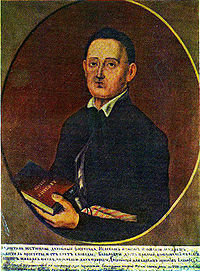Hryhorii Skovoroda
| Gregory Skovoroda | |
|---|---|
 |
|
| Born | 3 December 1722 village of Chernukhi, Lubny Regiment, Kiev Governorate, Russian Empire (present-day Ukraine) |
| Died | 9 November 1794 (age 71) village of Ivanovka, Kharkov Governorate, Russian Empire (now Ukraine) |
| Occupation | Writer, composer, teacher |
| Language | Latin, Greek, Church Slavonic, Ukrainian, Russian |
| Ethnicity | Ukrainian |
| Citizenship | Russian Empire |
Gregory Skovoroda, also Hryhorii Skovoroda, or Grigory Skovoroda (Latin: Gregorius Scovoroda, Ukrainian: Григорій Савич Сковорода, Hryhorii Savych Skovoroda; Russian: Григо́рий Са́ввич Сковорода́, Grigory Savvich Skovoroda; 3 December 1722 – 9 November 1794) was a philosopher of Cossack origin, who wrote primarily in the Sloboda Ukraine dialect of the Russian language. He was also a poet, teacher and composer of liturgical music. His significant influence on his contemporaries and succeeding generations and his way of life were universally regarded as Socratic, and he was often called a "Socrates." Skovoroda's work contributed to the cultural heritage of both modern-day Ukraine and Russia, both countries claiming him as a native son.
Skovoroda received his education at the Kiev Mogila Academy in Kiev. Haunted by worldly and spiritual powers, the philosopher led a life of an itinerant thinker-beggar. In his tracts and dialogs, biblical problems overlap with those examined earlier by Plato and the Stoics. Skovoroda's first book was issued after his death in 1798 in Saint Petersburg. Skovoroda's complete works were published for the first time in Saint Petersburg in 1861. Before this edition many of his works existed only in manuscript form.
Skovoroda was born into a small-holder Ukrainian Cossack family in the village of Chernukhi in Kiev Governorate,Russian Empire (modern-day Poltava Oblast, Ukraine), in 1722 (his mother may have been of partial Crimean Tatar ancestry). He was a student at the Kiev Mogila Academy (1734–1741, 1744–1745, 1751–1753) but did not graduate. In 1741, at the age of 19 due to his uncle Ignatiy Poltavtsev he was taken from Kiev to sing in the imperial choir in Moscow and St. Petersburg returning to Kiev in 1744. He spent the period from 1745 to 1750 in the kingdom of Hungary and is thought to have traveled elsewhere in Europe during this period as well. In 1750 he returned to Kiev. From 1750–1751 he taught poetics in Pereyaslav. For most of the period from 1753 to 1759 Skovoroda was a tutor in the family of a landowner in Kovrai. From 1759 to 1769, with interruptions, he taught such subjects as poetry, syntax, Greek, and ethics at the Kharkоv Collegium (also called Kharkiv Collegium). After an attack on his course on ethics in 1769 he decided to abandon teaching.
...
Wikipedia
